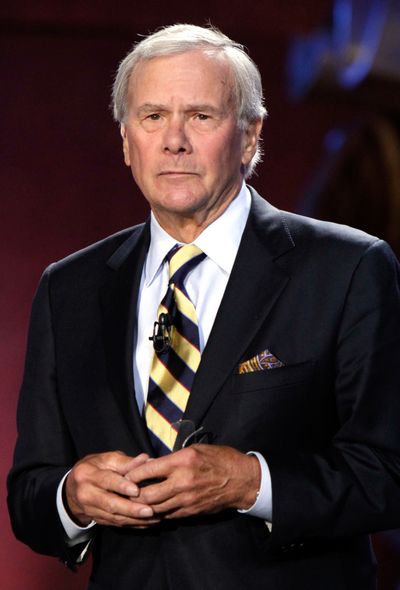Brokaw hopes program will broaden peoples views

Tom Brokaw hopes that his new documentary on discrimination will help calm some of the nation’s political discord, although he suspects the special may get caught up in it.
“Tom Brokaw Presents Bridging the Divide” premieres on the USA Network tonight at 7. Roughly timed to the half-century anniversary of the beginning of the U.S. civil rights movement, the special tells stories of people actively fighting bias they encountered in their own lives.
Subjects include a woman who had both legs amputated and became a scholar, track athlete and model and is a role model for the disabled, and a single mother whose 11-year-old son committed suicide after being bullied.
Brokaw says the “stressed state” of the nation due to economic woes and a lack of confidence in the future is the kind of thing that breeds intolerance.
Add the Internet, with the ability for anyone to say pretty much whatever they want whenever they want, and things can quickly get poisonous, he says.
“Most of the political dialogue these days, and too much of the media dialogue, is ‘in your face,’ ” Brokaw says.
“There has always been a rich American tradition of robust debate and taking strong positions. Now it just seems to me that the trend is steadily in the direction of being as divisive as possible, to belittle your opponents, and this is across the political spectrum. That kind of thing we need to get beyond.”
Brokaw was particularly taken with the story of Luma Mufleh.
The Jordanian-born, American-educated Mufleh visited the town of Clarkston, Ga., an Atlanta suburb that has been transformed with the influx of refugees from war-torn countries that make up more than half of its population of 8,000 residents.
She noticed some of the refugee children playing soccer in bare feet on dirt fields; the town had denied them access to many of its playing fields. She took on helping them as a project, organizing them into a team called the “Fugees.”
It isn’t always smooth; some of the players hear the N-word and other slurs directed toward them by players and fans of teams they are playing.
Welcoming these people with open arms “is a perfect example of what this nation is supposed to be about, which is to provide a refuge for the refugees,” Brokaw says.
That’s especially true when the U.S. is fighting wars in Iraq and Afghanistan partly to spread democratic ideals, he says.
Also profiled is Charlene Strong, a Seattle woman who was stopped from visiting her partner as she was dying in a hospital and now works nationally to support the rights of same-sex partners.
Brokaw says that in the current political climate, he expected the special – suggested to him by USA Network chief Bonnie Hammer – will itself become controversial. When he reported a few years ago on the issue of illegal immigration, he says, he got some angry responses from people who wanted to keep immigrants away.
“I hope it will generate some conversation within communities, families and business places,” Brokaw says. “Too much of what we see now is about division and not about unification.”
At the same time, the 70-year-old newsman hopes that viewers keep a sense of the big picture and how much has really changed in the nation in the past 50 years.
He sees it in television commercials, filled with African-American doctors, Latino teachers and Asian-American consumers.
“That’s a huge step,” Brokaw says. “It used to be just white males allowed. That’s the market responding to the realities of the country.”
He adds that he’s always believed in the long-term wisdom of the American people.
“The genius of this nation is that we’re more than the sum of our parts,” says Brokaw, “and we can’t forget that.”